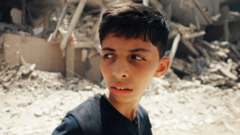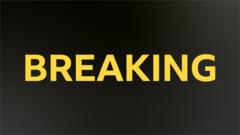Did the BBC's Gaza Documentary Violate Guidelines?

Understanding the BBC Documentary Controversy: A Deep Dive into the Gaza Narrative
The recent controversy surrounding the BBC documentary "Gaza: How to Survive a War Zone" has sparked significant discussion regarding editorial integrity, transparency, and the responsibilities of media organizations. Following the revelation that the narrator was the son of a Hamas official, the documentary was pulled from iPlayer, leading to an internal review by the BBC. This article will explore the findings of the review, the implications for the BBC and Hoyo Films, and the broader conversation about media ethics in reporting on sensitive geopolitical issues.
The Background of the Documentary
"Gaza: How to Survive a War Zone" was produced by Hoyo Films and narrated by a young boy whose family ties to Hamas only came to light after the documentary had been released. The production aimed to provide insights into life in Gaza amidst ongoing conflict, but the revelation of the narrator's familial connections raised questions about potential bias and the integrity of the content.
The Review Process
In light of the controversy, BBC Director General Tim Davie commissioned a review to assess the documentary’s adherence to editorial guidelines, particularly concerning accuracy and impartiality. The review found that:
- The independent production company, Hoyo Films, bore the majority of the responsibility for the oversight.
- Some members of Hoyo Films were aware of the narrator's family connections, while no one at the BBC had this knowledge prior to the controversy.
- The BBC team was criticized for their lack of proactive editorial checks and oversight.
Key Findings of the Review
The review, conducted by Peter Johnston, the BBC's Director of Editorial Complaints and Reviews, highlighted several critical points:
Lack of Disclosure
The failure to disclose the narrator's connection to Hamas was deemed a significant oversight. The review emphasized that transparency is paramount in journalism, especially in contexts where bias could influence perceptions of the content.
Responsibility and Accountability
While Hoyo Films was primarily responsible for the oversight, the review also found the BBC's editorial team at fault for not conducting sufficient checks. The report recommended implementing measures to enhance accountability within the organization.
Content Integrity
Despite the familial ties of the narrator, the review concluded that there was no evidence to suggest that the content of the documentary was directly influenced by the narrator’s father or family. However, the use of a child narrator in such a politically charged context was deemed inappropriate.
Implications for the BBC and Hoyo Films
The fallout from this review has profound implications for both organizations:
For the BBC
- The BBC has committed to taking steps to prevent similar breaches in the future, focusing on transparency and accuracy in its reporting.
- Tim Davie, the Director General, expressed regret over the incident, acknowledging the significant failing in relation to accuracy.
- The BBC Board reiterated the importance of trust and transparency in journalism, emphasizing that their credibility hinges on maintaining high editorial standards.
For Hoyo Films
- Hoyo Films has accepted the findings of the review and has apologized for the oversight, indicating a willingness to improve their processes.
- The production company expressed its intention to collaborate with the BBC to explore the possibility of re-editing some of the documentary material for future use.
Steps to Prevent Future Breaches
In response to the review, the BBC is implementing several measures to enhance its editorial oversight:
- Strengthening initial editorial checks to ensure all relevant information is disclosed before production approval.
- Training staff on the importance of transparency and bias recognition, particularly in sensitive geopolitical contexts.
- Establishing clearer protocols for accountability when breaches occur, ensuring that all team members understand their responsibilities.
The Importance of Editorial Integrity
This incident underscores the critical importance of editorial integrity in journalism. The media serves as a crucial intermediary between the public and complex global events, and any perceived bias can erode public trust. With the rise of misinformation, media organizations must prioritize accuracy, transparency, and impartiality to uphold their credibility.
Addressing the Broader Context of Media Ethics
The controversy surrounding the BBC documentary is not an isolated incident; it reflects ongoing challenges in media ethics, especially when covering politically sensitive topics. Journalists and producers must navigate a landscape fraught with competing narratives and vested interests.
Key Ethical Considerations in Media Reporting
- Impartiality: Media organizations must strive to present multiple viewpoints fairly, avoiding favoritism towards any particular perspective.
- Transparency: Disclosing potential conflicts of interest, such as familial ties to political entities, is essential for maintaining credibility.
- Accountability: Media organizations should have robust mechanisms for addressing errors and ensuring that responsible parties are held accountable.
Conclusion
The BBC documentary controversy serves as a potent reminder of the vital role that journalistic integrity plays in shaping public perception and trust. As media organizations navigate complex geopolitical landscapes, they must remain vigilant in their commitment to accuracy and transparency. The steps taken by the BBC and Hoyo Films in the wake of this incident are crucial in restoring faith in their reporting.
As consumers of news, it’s essential to approach media content critically, understanding the potential biases and influences at play. The ongoing conversation about media ethics will undoubtedly shape the future of journalism, as audiences demand greater accountability and transparency from their news sources.
In what ways do you think media organizations can improve their editorial practices to prevent similar controversies in the future?
Frequently Asked Questions
What led to the BBC documentary being pulled from iPlayer?
The documentary was pulled after it was revealed that the narrator was the son of a Hamas official, raising concerns about bias and accuracy.
Who is responsible for the oversight in the documentary?
The review found that Hoyo Films bore most of the responsibility, but the BBC also failed in its editorial checks.
What steps is the BBC taking to prevent future breaches?
The BBC is strengthening editorial checks, providing staff training on transparency, and establishing clearer accountability protocols.
Was the content of the documentary influenced by the narrator's family?
The review concluded there was no evidence that the narrator's family influenced the content of the documentary.
What are the broader implications of this controversy for journalism?
This incident highlights the critical importance of impartiality, transparency, and accountability in media reporting, especially on sensitive topics.
#GazaDocumentary #MediaEthics #JournalismIntegrity
Published: 2025-07-14 11:41:05 | Category: technology



